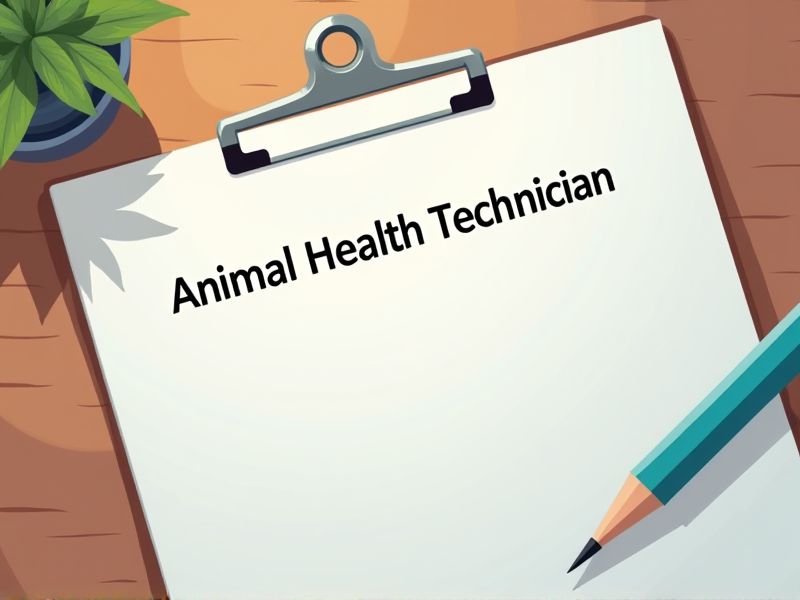
Animal Health Technicians need specific certifications to ensure they have the necessary skills and knowledge to handle the complexities of animal care. Proper certification validates their expertise in medical procedures, ensuring both animal welfare and workplace safety. Certifications also help employers identify qualified candidates who can effectively contribute to veterinary practices. Important certifications you may need as an Animal Health Technician include those related to laboratory work, radiology, and anesthesia.
Registered Veterinary Technician (RVT)
Registered Veterinary Technicians (RVTs) ensure precise medical procedures due to their specialized training. Their expertise contributes to better diagnostic outcomes, enhancing the veterinarian's ability to devise effective treatment plans. RVTs play a critical role in educating pet owners on proper care, impacting overall animal well-being positively. Their presence often leads to improved efficiency in clinics, allowing practices to handle a higher volume of patients safely.
Certified Veterinary Technician (CVT)
Certified Veterinary Technicians (CVTs) provide essential support to veterinarians, enhancing the overall quality of animal care through specialized skills. With comprehensive knowledge in animal physiology and medical procedures, they ensure accurate diagnostics and effective treatments. Their expertise in handling medical equipment and administering medications increases efficiency in veterinary practices. Having a CVT on staff also means improved communication with pet owners, aiding in better adherence to post-treatment care instructions.
Certified Veterinary Assistant (CVA)
An Animal Health Technician often works alongside veterinarians and requires a Certified Veterinary Assistant (CVA) to ensure the smooth handling of animal care procedures. CVAs bring critical skills such as assisting in surgery preparation, which enhances the technician's ability to focus on specialized tasks. They alleviate workload pressure by managing routine tasks, allowing the technician to concentrate on complex diagnostics. With a CVA, the team can deliver comprehensive care more efficiently, improving overall treatment outcomes for animals.
National Registry of Certified Veterinary Technicians (NRCVT)
The National Registry of Certified Veterinary Technicians (NRCVT) ensures a standardized level of competency across the profession, which enhances the overall quality of animal care. Certification through NRCVT provides credibility and recognition to veterinary technicians, increasing trust among employers and the public. Such a registry helps maintain current knowledge and skills, as it often requires ongoing education and periodic recertification. Establishing a national registry assists in creating a unified professional identity, facilitating mobility and job opportunities across state lines.
Veterinary Patient Care Technician Certification
The Veterinary Patient Care Technician Certification ensures that an Animal Health Technician possesses the necessary skills and knowledge to provide high-quality care to animals. This certification helps standardize the level of expertise across the field, ensuring consistent service and care for patients. With certification, technicians can demonstrate their commitment to professionalism and continued education, which can enhance career opportunities. Certified technicians are often more trusted by both employers and pet owners, leading to better job prospects and increased responsibility in animal healthcare settings.
Animal CPR and First Aid Certification
Animal Health Technicians often find themselves in situations where swift emergency response is crucial, and having a certification in Animal CPR and First Aid equips them to act efficiently. Timely CPR and first aid can significantly increase an animal's chance of survival during critical incidents. Certification ensures that technicians are familiar with the latest techniques and best practices, minimizing the risk of errors. Trained technicians boost clients' confidence, ensuring that pets receive the best possible care in emergencies.
Laboratory Animal Care Technician Certification
Certification as a Laboratory Animal Care Technician often leads to improved animal welfare because it ensures technicians possess the essential knowledge and skills. This certification enhances credibility and trust among employers and institutions involved in research and animal care. Achieving certification can result in career advancement for animal health technicians by differentiating them in a competitive job market. Certification also aligns with regulatory and ethical guidelines which promotes standards for handling and caring for laboratory animals.
Veterinary Pharmacology Certification
Veterinary pharmacology certification equips animal health technicians with essential knowledge about drug interactions and effects, which enhances animal care. With specialized training, technicians become more effective in administering medications accurately and managing potential adverse reactions. Increased proficiency contributes to better communication with veterinarians, improving treatment plans and patient outcomes. Employers often seek certified technicians to ensure compliance with regulations and uphold standards of animal welfare.
Animal Handling and Restraint Certification
Animal Handling and Restraint Certification for Animal Health Technicians ensures they possess the skills needed to safely manage animals during medical procedures, minimizing risk. Without proper certification, technicians might inadvertently cause harm to animals or themselves, leading to potential safety concerns and liability issues. Certification also signifies a standard level of competence and understanding of animal behavior, which is essential for effective veterinary care. It enhances the technician's ability to contribute to a more efficient and stress-free clinical environment.
Animal Behavior and Enrichment Certification
Animal Behavior and Enrichment Certification equips Animal Health Technicians with the skills to understand animal behaviors, leading to more accurate health assessments. By applying enrichment principles, technicians can reduce stress-related illnesses in animals under their care. Certification ensures that technicians can design and implement enrichment programs, fostering mental well-being in animals. This specialized knowledge also enhances technician ability to communicate effectively with pet owners about behavioral issues, contributing to overall animal welfare.
Summary
By obtaining certifications, you can gain specialized knowledge and skills that enhance your proficiency in animal health care. This leads to better job opportunities as employers often prefer certified technicians for advanced roles. Clients tend to trust your expertise more, thereby improving client satisfaction and retention. Overall, certifications can lead to career advancement and potentially higher wages.
